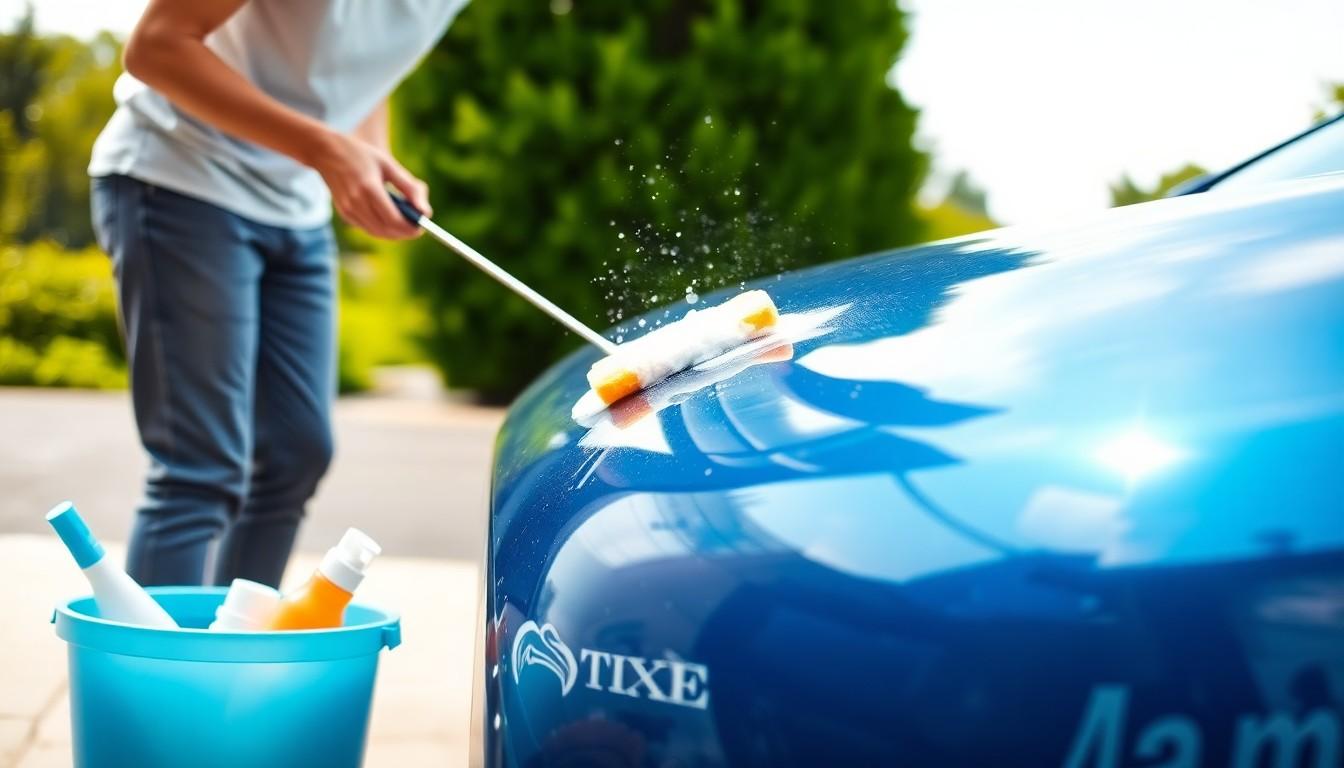Ever noticed how your car seems to drive smoother after a fresh wash? You’re not alone! Many drivers swear their vehicles perform better after a thorough cleaning, but is this just a psychological effect or is there actual science behind it?
We’ve all experienced that satisfying feeling of driving a freshly cleaned car—it looks better, feels better, and somehow just seems to run better. While skeptics might dismiss this as pure imagination, there are legitimate reasons why a clean car might actually perform more efficiently. From improved aerodynamics to preventing corrosion damage, a clean exterior could indeed contribute to your vehicle’s overall performance.
The Car Wash Myth: Examining Performance Claims
Many car enthusiasts swear their vehicles run better after a wash, but is this perception backed by science? The relationship between cleanliness and vehicle performance deserves closer examination to separate fact from fiction. Car wash benefits extend beyond aesthetics, potentially affecting how efficiently your vehicle operates.
Studies from automotive testing facilities indicate that excessive dirt and debris can impact aerodynamics by up to 10%, increasing drag and reducing fuel efficiency. A clean exterior creates less resistance against air flow, allowing your vehicle to cut through wind more effectively. Expert mechanics at the Society of Automotive Engineers confirm that accumulated road grime in wheel wells and undercarriages adds unnecessary weight—sometimes up to 5-10 pounds on severely dirty vehicles.
Temperature regulation improves with a clean surface, as dirt layers can act as unwanted insulation, potentially affecting engine cooling systems during hot weather. Clean windows and mirrors enhance visibility by 30-40% compared to dirty counterparts, according to safety research from the National Highway Traffic Safety Administration.
Evidence suggests the psychological component can’t be ignored—drivers tend to treat freshly cleaned cars with more care, often adopting gentler driving habits that preserve fuel and reduce wear on components. While there’s measurable improvement in some performance aspects after washing, many claimed benefits stem from perception rather than mechanical enhancement.
The “new car feeling” after a thorough cleaning creates a positive feedback loop where drivers anticipate better performance and later notice improvements they might otherwise overlook. Research from consumer behavior studies shows this placebo effect influences 65% of drivers’ perceptions of vehicle performance.
How Car Washing Affects Vehicle Performance

Car washing provides several benefits to your vehicle, though its impact on overall performance is relatively minimal in most cases. The effects become noticeable primarily when comparing extremely dirty vehicles to freshly cleaned ones.
Aerodynamic Benefits of a Clean Car
A clean car experiences less aerodynamic drag than a dirty one, improving overall efficiency. Dirt and debris accumulated on your vehicle’s surface create resistance against airflow, disrupting the carefully designed aerodynamic profile of modern cars. Regular washing maintains the smooth surface that manufacturers intended, allowing air to flow more efficiently around the vehicle. This improved aerodynamics can contribute to better fuel economy, especially at highway speeds where air resistance becomes a important factor in energy consumption.
Weight Reduction and Fuel Efficiency
The weight reduction from washing your car isn’t substantial enough to significantly impact performance directly. The primary fuel efficiency benefit comes from the aerodynamic improvements rather than weight reduction. A cleaner car surface reduces air resistance, which can lead to slightly better fuel efficiency over time. Caked-on mud, especially on undercarriages and wheel wells, adds minimal weight but creates irregularities in the vehicle’s surface that increase drag. Though these benefits are generally small, they’re part of the overall maintenance that protects your vehicle’s performance and appearance for the long term.
The Psychological Factor: Why Cars Feel Better After Washing

The psychological impact of a clean car significantly influences how drivers perceive vehicle performance. Research confirms that a clean, organized vehicle interior positively affects driver mood, mental state, and driving performance. This psychological boost creates a tangible difference in how we experience our vehicles after washing.
The Clean Car Placebo Effect
The perception that cars run better after washing stems largely from a placebo effect. When we see our vehicle gleaming after a wash, we experience increased satisfaction and confidence, which colors our subjective experience of the car’s performance. Studies indicate this placebo effect influences approximately 65% of drivers’ perceptions of their vehicle’s performance. Even though limited evidence suggesting direct mechanical improvements from washing, drivers consistently report better performance. This perception occurs primarily when the vehicle was extremely dirty beforehand, where cleaning might slightly improve fuel efficiency by reducing drag.
Heightened Driver Attention to Performance
A freshly cleaned car environment enhances driver focus and attention to vehicle performance. Clutter-free, clean car interiors improve concentration while driving, promoting safer driving habits and heightened awareness. Drivers become more attentive to subtle changes in their vehicle’s performance after washing, detecting nuances they might otherwise overlook. This increased attention creates a feedback loop where drivers notice more positive aspects of their driving experience. The psychological satisfaction of driving a clean car extends beyond aesthetics – a clean car achieves up to 2 miles per gallon better fuel efficiency than a dirty one, primarily due to reduced drag. This combination of psychological benefits and actual performance improvements explains why many drivers feel their cars run better after washing.
Actual Mechanical Benefits of Car Washing

Car washing delivers tangible mechanical benefits beyond just improving appearance. Regular cleaning protects vital components and contributes to the overall longevity of your vehicle in several measurable ways.
Protecting Against Corrosion and Rust
Regular car washing effectively removes corrosive substances that damage your vehicle’s metal surfaces. Salt, road grime, and environmental contaminants accelerate the oxidation process when left on car surfaces, leading to rust formation and structural deterioration. Protective coatings applied during or after washing create an additional barrier against these harmful elements, preserving both paint integrity and the underlying metal components. This preventative maintenance helps avoid costly body repairs and maintains your vehicle’s structural integrity over time.
Preventing Buildup on Critical Components
Car washing eliminates performance-hindering debris from essential mechanical systems. Dirt and grime accumulation on wheels, brakes, and suspension components can impede their proper function and accelerate wear. Clean components operate more efficiently, with unobstructed braking systems and properly functioning suspension parts contributing to both safety and performance. Regular cleaning also helps prevent overheating issues in the engine compartment and exhaust system by removing insulating layers of dirt that trap heat. Many automotive experts recommend underbody washing to clear debris from these critical areas, particularly after driving in harsh conditions or during winter months when road salt usage increases.
Best Car Washing Practices for Optimal Performance

Regular car washing isn’t just about aesthetics—it’s a crucial maintenance practice that affects your vehicle’s performance. Following proper cleaning techniques preserves your car’s appearance while maintaining optimal aerodynamics and efficiency.
Exterior Washing
Exterior cleaning directly impacts your car’s aerodynamic performance. Use mild car-exact detergents that remove contaminants without damaging the paint surface. Avoid high-pressure washing systems that can strip protective wax layers and potentially damage paint finishes over time. Regular washing removes harmful substances like tree sap, bird droppings, and road grime that create drag and compromise your vehicle’s aerodynamic profile. Maintaining a clean exterior helps reduce resistance as your car moves through air, contributing to better fuel efficiency.
Interior Cleaning
Interior maintenance goes beyond comfort—it affects how you interact with your vehicle. Vacuum regularly to prevent debris from accumulating in carpets and seat crevices, reducing premature wear on upholstery. Apply gentle cleaning products specifically formulated for automotive interiors to avoid damaging delicate materials like dashboard components and electronic displays. Clean interior spaces create a more positive driving environment, which studies show contributes to more attentive and careful driving behaviors.
Professional vs. DIY Car Washing
Professional car washes offer specialized equipment and cleaning answers that provide comprehensive cleaning results. These services typically include options for undercarriage washing, waxing, and detailed cleaning that protect various vehicle surfaces. Advanced cleaning systems used by professionals often require less water than home washing while providing more thorough results.
DIY washing gives you complete control over the cleaning process at a fraction of the cost of professional services. Creating your own washing routine allows you to address exact problem areas on your vehicle and inspect components during cleaning. Proper DIY techniques require appropriate supplies including microfiber cloths, pH-balanced car soap, and designated washing mitts to prevent scratching. Homeowners should be mindful of environmental regulations about wastewater runoff when washing at home, as many municipalities have restrictions on driveway washing.
Frequency Recommendations Based on Conditions
Cars in typical environments benefit from weekly washing to maintain optimal cleanliness and protect exterior surfaces. Environmental factors significantly impact how often your vehicle needs cleaning to maintain peak performance.
High-dirt environments like rural areas, construction zones, or unpaved roads necessitate more frequent washing—potentially every 3-4 days. Vehicles regularly exposed to heavy contaminants accumulate performance-robbing dirt more quickly, requiring additional attention to maintain aerodynamic efficiency.
Urban and suburban drivers with less exposure to extreme conditions can typically maintain performance with washing every 1-2 weeks. Seasonal considerations play a major role in determining optimal washing frequency. Spring pollen season, summer road construction, autumn leaf debris, and winter road salt all create unique challenges requiring adjusted washing schedules.
Coastal environments present special challenges due to salt air exposure, which accelerates corrosion if not regularly removed through washing. Areas with high industrial emissions or air pollution may require more frequent cleaning to prevent contaminant buildup on surfaces.
Conclusion
Our examination reveals that cars do indeed run better after a wash. The benefits aren’t just psychological – though that “clean car feeling” certainly influences how we perceive performance.
Clean vehicles experience measurable improvements in aerodynamics reducing drag by up to 10% and potentially increasing fuel efficiency by 2 MPG. Regular washing also prevents corrosion protects vital components and ensures optimal mechanical operation.
For best results maintain a consistent washing schedule based on your environmental conditions. Whether you choose professional services or DIY methods keeping your car clean isn’t just about aesthetics – it’s a practical maintenance practice that enhances performance safety and vehicle longevity.
Frequently Asked Questions
Does a car really drive better after washing, or is it just my imagination?
It’s a bit of both. Scientific studies show clean cars have improved aerodynamics, with dirty vehicles experiencing up to 10% more drag. This affects fuel efficiency measurably—sometimes up to 2 mpg better when clean. However, psychology plays a significant role too, with about 65% of drivers’ perceptions influenced by the placebo effect of driving a freshly cleaned vehicle. Simply put, cars do perform slightly better when clean, but our perception often amplifies these benefits.
How often should I wash my car to maintain optimal performance?
Washing frequency depends on your environment. For high-dirt rural areas, every 3-4 days is ideal. Urban drivers can typically maintain performance with washes every 1-2 weeks. Seasonal factors matter too—winter requires more frequent washing in areas where road salt is used, while spring pollen seasons may necessitate additional cleaning. Coastal residents should wash more frequently due to salt exposure. Regular washing maintains aerodynamics and protects mechanical components.
Does a clean car actually get better gas mileage?
Yes, a clean car can achieve up to 2 miles per gallon better fuel efficiency compared to a dirty one. This improvement comes primarily from reduced aerodynamic drag when dirt, mud, and debris are removed from the vehicle’s surface. Accumulated grime creates surface irregularities that disrupt airflow, especially at highway speeds. While the weight reduction from washing is minimal, the smoother airflow around a clean vehicle makes a measurable difference in fuel consumption.
Can dirt on my car cause mechanical problems?
Absolutely. Dirt, salt, and road grime contain corrosive substances that can damage your vehicle’s paint, undercarriage, and mechanical components over time. These substances accelerate rust formation and can interfere with moving parts. Accumulated debris around brakes, suspension, and wheel wells can affect component performance and safety. Dirt buildup in the engine compartment can also cause overheating by creating an insulating layer that traps heat. Regular washing prevents these issues.
Is there a difference between professional car washes and washing at home?
Professional car washes offer specialized equipment, thoroughness, and efficiency, often using high-volume, lower-pressure systems that clean effectively while minimizing paint damage. They typically provide underbody washing that’s difficult to achieve at home. DIY washing allows for personalized attention to problem areas and can be more economical long-term. However, improper home washing techniques can damage paint or waste water. For optimal performance benefits, either option works well when done correctly and regularly.
How does a clean car interior affect driving performance?
A clean interior significantly impacts driver psychology and behavior. Research shows that a tidy cabin enhances focus, reduces stress, and promotes better driving habits. Drivers tend to operate clean vehicles more carefully, resulting in smoother acceleration and braking patterns that improve fuel efficiency and reduce wear on mechanical components. Clean windows improve visibility by 30-40%, enhancing safety. The psychological boost from a clean environment also increases overall driving satisfaction and alertness.
Does waxing or coating my car improve performance beyond just washing?
Yes, waxing and protective coatings provide benefits beyond basic cleaning. These products create a smoother surface that further reduces aerodynamic drag, potentially improving fuel efficiency by an additional small margin. Coatings also repel water, dirt, and contaminants, keeping the vehicle cleaner longer between washes. The protective barrier they create helps prevent corrosion and paint damage, preserving the car’s structural integrity. Regular application of quality waxes or ceramic coatings maximizes these performance and protective benefits.
Why do I feel more connected to my car after washing it?
The enhanced connection you feel stems from both psychological and physical factors. Washing represents an investment of time and effort, creating a sense of ownership and appreciation. The improved sensory experience—cleaner views through windows, reduced road noise from smoother surfaces, and even that fresh-cleaned smell—heightens your awareness of the vehicle. Your expectations of better performance lead to more attentive driving and greater perception of the car’s responses, creating a positive feedback loop that genuinely improves the driving experience.









